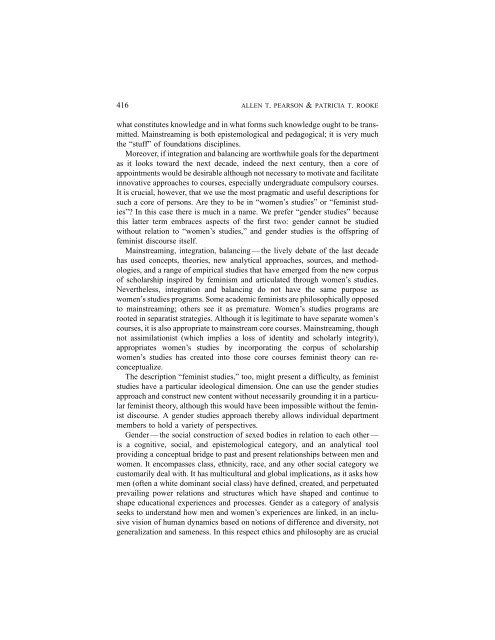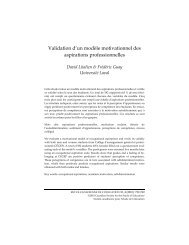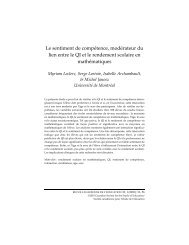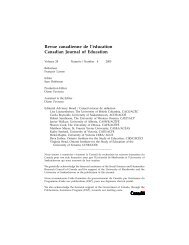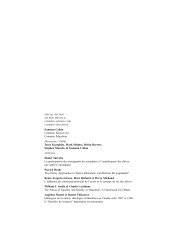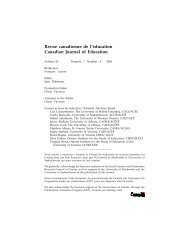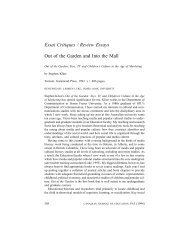Mireille Falardeau et Michel Loranger Le choix de stratégies ... - CSSE
Mireille Falardeau et Michel Loranger Le choix de stratégies ... - CSSE
Mireille Falardeau et Michel Loranger Le choix de stratégies ... - CSSE
Create successful ePaper yourself
Turn your PDF publications into a flip-book with our unique Google optimized e-Paper software.
416 ALLEN T. PEARSON & PATRICIA T. ROOKE<br />
what constitutes knowledge and in what forms such knowledge ought to be transmitted.<br />
Mainstreaming is both epistemological and pedagogical; it is very much<br />
the “stuff” of foundations disciplines.<br />
Moreover, if integration and balancing are worthwhile goals for the <strong>de</strong>partment<br />
as it looks toward the next <strong>de</strong>ca<strong>de</strong>, in<strong>de</strong>ed the next century, then a core of<br />
appointments would be <strong>de</strong>sirable although not necessary to motivate and facilitate<br />
innovative approaches to courses, especially un<strong>de</strong>rgraduate compulsory courses.<br />
It is crucial, however, that we use the most pragmatic and useful <strong>de</strong>scriptions for<br />
such a core of persons. Are they to be in “women’s studies” or “feminist studies”?<br />
In this case there is much in a name. We prefer “gen<strong>de</strong>r studies” because<br />
this latter term embraces aspects of the first two: gen<strong>de</strong>r cannot be studied<br />
without relation to “women’s studies,” and gen<strong>de</strong>r studies is the offspring of<br />
feminist discourse itself.<br />
Mainstreaming, integration, balancing — the lively <strong>de</strong>bate of the last <strong>de</strong>ca<strong>de</strong><br />
has used concepts, theories, new analytical approaches, sources, and m<strong>et</strong>hodologies,<br />
and a range of empirical studies that have emerged from the new corpus<br />
of scholarship inspired by feminism and articulated through women’s studies.<br />
Nevertheless, integration and balancing do not have the same purpose as<br />
women’s studies programs. Some aca<strong>de</strong>mic feminists are philosophically opposed<br />
to mainstreaming; others see it as premature. Women’s studies programs are<br />
rooted in separatist strategies. Although it is legitimate to have separate women’s<br />
courses, it is also appropriate to mainstream core courses. Mainstreaming, though<br />
not assimilationist (which implies a loss of i<strong>de</strong>ntity and scholarly integrity),<br />
appropriates women’s studies by incorporating the corpus of scholarship<br />
women’s studies has created into those core courses feminist theory can reconceptualize.<br />
The <strong>de</strong>scription “feminist studies,” too, might present a difficulty, as feminist<br />
studies have a particular i<strong>de</strong>ological dimension. One can use the gen<strong>de</strong>r studies<br />
approach and construct new content without necessarily grounding it in a particular<br />
feminist theory, although this would have been impossible without the feminist<br />
discourse. A gen<strong>de</strong>r studies approach thereby allows individual <strong>de</strong>partment<br />
members to hold a vari<strong>et</strong>y of perspectives.<br />
Gen<strong>de</strong>r — the social construction of sexed bodies in relation to each other —<br />
is a cognitive, social, and epistemological category, and an analytical tool<br />
providing a conceptual bridge to past and present relationships b<strong>et</strong>ween men and<br />
women. It encompasses class, <strong>et</strong>hnicity, race, and any other social category we<br />
customarily <strong>de</strong>al with. It has multicultural and global implications, as it asks how<br />
men (often a white dominant social class) have <strong>de</strong>fined, created, and perp<strong>et</strong>uated<br />
prevailing power relations and structures which have shaped and continue to<br />
shape educational experiences and processes. Gen<strong>de</strong>r as a category of analysis<br />
seeks to un<strong>de</strong>rstand how men and women’s experiences are linked, in an inclusive<br />
vision of human dynamics based on notions of difference and diversity, not<br />
generalization and sameness. In this respect <strong>et</strong>hics and philosophy are as crucial


